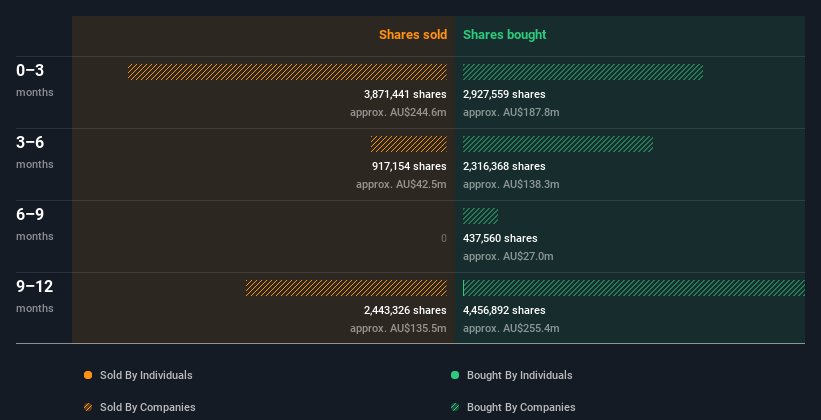ASX Insiders Placed Bullish Bets Worth AU$1.50m
Usually, when one insider buys stock, it might not be a monumental event. But when multiple insiders are buying like they did in the case of ASX Limited (ASX:ASX), that sends out a positive message to the company's shareholders.
While insider transactions are not the most important thing when it comes to long-term investing, logic dictates you should pay some attention to whether insiders are buying or selling shares.
View our latest analysis for ASX
The Last 12 Months Of Insider Transactions At ASX
Over the last year, we can see that the biggest insider purchase was by Independent Non-Executive Chairman Damian Roche for AU$644k worth of shares, at about AU$64.36 per share. That means that even when the share price was higher than AU$58.49 (the recent price), an insider wanted to purchase shares. Their view may have changed since then, but at least it shows they felt optimistic at the time. To us, it's very important to consider the price insiders pay for shares. Generally speaking, it catches our eye when insiders have purchased shares at above current prices, as it suggests they believed the shares were worth buying, even at a higher price.
In the last twelve months ASX insiders were buying shares, but not selling. You can see the insider transactions (by companies and individuals) over the last year depicted in the chart below. If you click on the chart, you can see all the individual transactions, including the share price, individual, and the date!
ASX is not the only stock insiders are buying. So take a peek at this free list of under-the-radar companies with insider buying.
Insider Ownership
Another way to test the alignment between the leaders of a company and other shareholders is to look at how many shares they own. We usually like to see fairly high levels of insider ownership. From our data, it seems that ASX insiders own 0.1% of the company, worth about AU$14m. Whilst better than nothing, we're not overly impressed by these holdings.
What Might The Insider Transactions At ASX Tell Us?
The fact that there have been no ASX insider transactions recently certainly doesn't bother us. However, our analysis of transactions over the last year is heartening. Overall we don't see anything to make us think ASX insiders are doubting the company, and they do own shares. So while it's helpful to know what insiders are doing in terms of buying or selling, it's also helpful to know the risks that a particular company is facing. In terms of investment risks, we've identified 1 warning sign with ASX and understanding it should be part of your investment process.
If you would prefer to check out another company -- one with potentially superior financials -- then do not miss this free list of interesting companies, that have HIGH return on equity and low debt.
For the purposes of this article, insiders are those individuals who report their transactions to the relevant regulatory body. We currently account for open market transactions and private dispositions of direct interests only, but not derivative transactions or indirect interests.
Have feedback on this article? Concerned about the content? Get in touch with us directly. Alternatively, email editorial-team (at) simplywallst.com.
This article by Simply Wall St is general in nature. We provide commentary based on historical data and analyst forecasts only using an unbiased methodology and our articles are not intended to be financial advice. It does not constitute a recommendation to buy or sell any stock, and does not take account of your objectives, or your financial situation. We aim to bring you long-term focused analysis driven by fundamental data. Note that our analysis may not factor in the latest price-sensitive company announcements or qualitative material. Simply Wall St has no position in any stocks mentioned.
Have feedback on this article? Concerned about the content? Get in touch with us directly. Alternatively, email editorial-team@simplywallst.com

 Yahoo Finance
Yahoo Finance 
